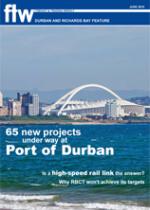Dealing with Transnet Port
Terminals (TPT) can be
frustrating, but hopes are
high that the parastatal will see the
benefit of improving efficiency and
implementing solutions.
So says Carl Webb, managing
director of Project Logistics
Management, specialists in abnormal
and project transport logistics across
the country.
“Improved efficiency by TPT will
result in improved revenue, which
will make everyone’s lives easier,
and keep costs manageable,” says
Webb. “While TPT management is
willing to meet with the industry and
discuss problems, a major problem
remains the implementation
of solutions.”
Two major challenges in Durban/
Richards Bay at present involve
dealing with TPT, and abnormal
load routes out of KZN, says
Webb. “TPT is constantly changing
operating procedures which causes
unnecessary delays in uplifting cargo
from the port,” says Webb. “Their
restricted working hours and shortage
of equipment have also contributed
to increased costs being incurred,
which is particularly irritating in
these economic times. In spite of
assurances at meetings with TPT
management, promised solutions
are not implemented. The abnormal
load routes out of Durban have been
restricted due to the closure of the
PX depot by-pass, which has resulted
in clients having to ship some cargo
via Richards Bay, which obviously
results in increases in costs.”
He says they have tried to discuss
the requirement to keep the high
route out of Durban open, but
Transnet Properties have chosen to
ignore requests, and have rented the
property out.
“The fact that the floating crane
is situated in Durban, which has
both height and mass restrictions,
is also difficult to comprehend.
The route limitations out of Durban
compel clients to ship cargo via
Richards Bay on self-geared vessels,
which cost substantially more than
conventional vessels on regular
sailing schedules. The superload
route out of Richards Bay is also
under repair until mid-2011, creating
an additional problem in locating
alternative routes.”
The matter is currently being
addressed by the newly formed
Superload Council of South Africa
( SCSA ), but to further compound
the problem the existing route via
Pongola, Piet Retief and Ermelo has
always been kept open for superloads
when undertaking repairs in the
past, but for some reason Sanral has
decided to close the route for the
duration of the latest repairs.
“It is not a simple matter to locate
alternative superload routes. Not
only do all bridges and structures
require investigation to determine
their capacity and state of repair,
but suitable lay-bys for superload
vehicles have to be identified or
created, all of which increases the
costs substantially. All of the costs
mentioned are obviously passed on to
the client, which results in increased
cost to projects in South Africa,”
says Webb.
On a positive note, the KZNPA
and Free State abnormal permit
authorities, says Webb, have eased
certain restrictions on moving
abnormal cargo over weekends,
which has resulted in a drop in traffic
congestion and an increase in client
service and vehicle utilisation.
In the meantime Webb believes
that as the ports of Ngqura, Walvis
Bay, Maputo and Beira continue to
up their game, TPT in Durban will
have to address issues if it wants to
remain competitive.
“There is no doubt that Durban is a
main port of entry for cargo into the
interior and an important port, but it
is going to have to up its game,”
says Webb.
Durban port must up its game to compete
09 Jul 2010 - by Liesl Venter
0 Comments
Durban 2010

09 Jul 2010
09 Jul 2010
09 Jul 2010
09 Jul 2010
09 Jul 2010
09 Jul 2010
09 Jul 2010
09 Jul 2010
09 Jul 2010
09 Jul 2010
09 Jul 2010
09 Jul 2010
Border Beat
Featured Jobs
New
New
New
